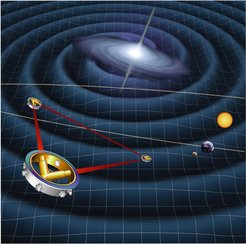Visions for outer space
News release from the Max Planck Institute for Extraterrestrial Physics: Participants of a workshop on fundamental research demand a strategy paper on national aereospace
Outer space - an infinite expanse with many opportunities for science. In which areas can research be carried out under zero gravity? What plans are there for medium and long-term projects? What funding is available? One hundred and twenty representatives from science, industry and politics discussed these issues at a two-day workshop organized by the Max Planck Institute for Extraterrestrial Physics. The aim of the event, held at the Bavarian Ministry for Economic Affairs, was to prepare a strategy paper on national aerospace.

"These are the best times for aerospace in 20 years," said Jürgen Breitkopf, CEO of the medium-sized company Kayser-Threde, at the beginning of the event. He was referring to budget, as well as the opportunity to take up key positions Europe-wide from Germany. Breitkopf called on researchers to put forward definite, long-term plans. "Then there’s a good chance that they will be implemented," he said. Open dialogue between partners from science and industry is decisive - and formed the focal point of the Munich-based workshop.
The point of departure from which to start are, in fact, quite good. According to Ludwig Baumgarten, an Executive Board member of the German Aerospace Center, Germany is leading the way in research under zero gravity. He highlighted the experiments with complex plasmas and the Bose-Einstein condensate. "German scientists are also at the forefront in the LISA and LISA-Pathfinder missions to provide evidence of gravitational waves," explained Baumgarten. The upshot: "A strong national program is required to enable us to also take part in European projects.
Baumgarten’s fellow Executive Board member, Thomas Reiter, called for a new strategic approach to be adopted for German aerospace as a matter of urgency. "The last program was developed in 2001 by the Federal Ministry of Research," said the former astronaut, who was aboard the Russian Mir space station and the international ISS. Reiter believes that the German Aerospace Center should draw up a strategy paper for the next 15 to 20 years that would provide the basis for a follow-up program.
Workshop co-organizer Gregor Morfill, Director at the Max Planck Institute for Extraterrestrial Physics, broadly outlined the prospects for basic research in outer space. "We know of 17 natural constants. Could they perhaps be reduced to one? And are these constants really constant?" The physicist gave this as an example of one of the unresolved questions. "Several of these fundamental issues are now at a very exciting stage, and a significant breakthrough is imminent," Morfill explained. He said German scientists are well positioned and would play a significant role in many areas in future. He added: "The political will and resolve to create a sustainable national strategy is now required."
Scientists from Max Planck institutes, universities and other research facilities outlined their projects and ideas in eight sessions. These covered a wide range of areas, including the search for dark energy, analysis of universally critical phenomena, experiments with soft matter and the study of quantum-mechanical and relativistic effects. Apparently, there is no lack of vision.
Gregor Morfill drew a positive conclusion: "The symposium has shown that Germany has a wealth of ideas - and more importantly that German scientists also have the capability to carry out research into many of the fundamental remaining questions in physics, astronomy and materials research using innovative methods." The desire and capability must now be implemented in practice. "We need a strong aerospace industry that is also committed to meeting the challenges and requirements of science, and a political strategy to sustainably support the many excellent approaches, so that we can reap the rewards for ourselves."












